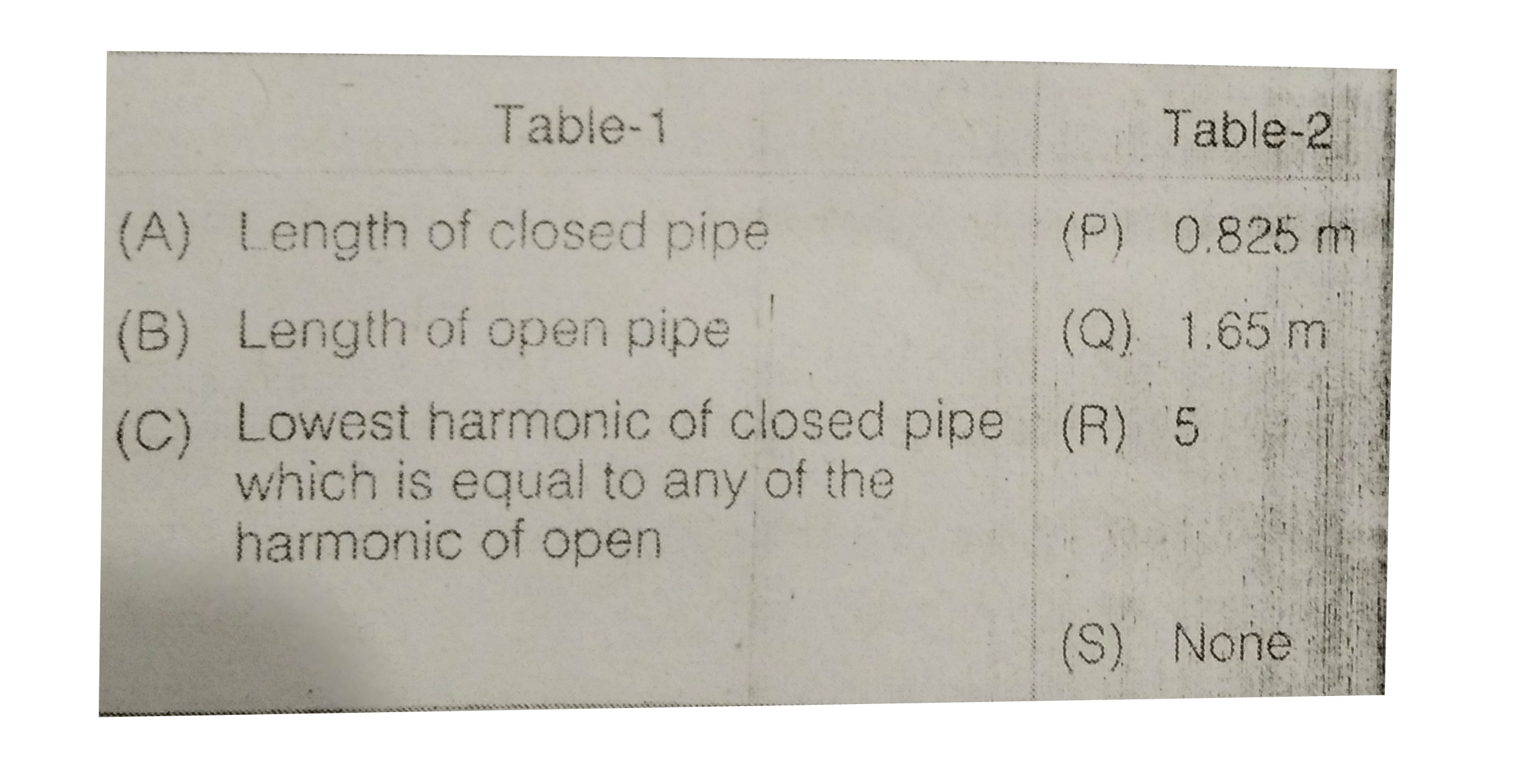Fundamental frequency of pipe is 100 Hz and other two frequencies are 300 Hz and 500 Hz then
Pipe is open at both the ends
pipe is closed at both the ends
One end open and another end is closed
None of the above
The correct Answer is:C
To solve the problem regarding the fundamental frequency of a pipe and its harmonics, we will analyze the given frequencies and determine their relationship with the fundamental frequency.
Given:
- Fundamental frequency f1=100Hz
- Other frequencies f2=300Hz and f3=500Hz
1. Identify the Harmonics:
The fundamental frequency is the first harmonic (n=1). The frequencies of the harmonics can be calculated as:
- For a pipe open at both ends, the harmonics are integer multiples of the fundamental frequency:
fn=n⋅f1
- For a pipe closed at one end, the harmonics are odd multiples of the fundamental frequency:
fn=(2n−1)⋅f1
2. Check the Frequencies:
- For f2=300Hz:
n=f2f1=300100=3
This is the 3rd harmonic for a pipe open at both ends.
- For f3=500Hz:
n=f3f1=500100=5
This is the 5th harmonic for a pipe open at both ends.
3. Determine the Type of Pipe:
Since both 300 Hz and 500 Hz are integer multiples of the fundamental frequency (100 Hz), we can conclude that these frequencies correspond to a pipe that is open at both ends.
4. Conclusion:
The frequencies 300 Hz and 500 Hz are valid harmonics of the fundamental frequency of 100 Hz for a pipe open at both ends.
- Fundamental frequency f1=100Hz
- Other frequencies f2=300Hz and f3=500Hz
The fundamental frequency is the first harmonic (n=1). The frequencies of the harmonics can be calculated as:
- For a pipe open at both ends, the harmonics are integer multiples of the fundamental frequency:
fn=n⋅f1
- For a pipe closed at one end, the harmonics are odd multiples of the fundamental frequency:
fn=(2n−1)⋅f1
- For f2=300Hz:
n=f2f1=300100=3
This is the 3rd harmonic for a pipe open at both ends.
- For f3=500Hz:
n=f3f1=500100=5
This is the 5th harmonic for a pipe open at both ends.
Since both 300 Hz and 500 Hz are integer multiples of the fundamental frequency (100 Hz), we can conclude that these frequencies correspond to a pipe that is open at both ends.
The frequencies 300 Hz and 500 Hz are valid harmonics of the fundamental frequency of 100 Hz for a pipe open at both ends.
Topper's Solved these Questions
- WAVESBOOK - AAKASH SERIESCHAPTER - WAVESEXERCISE - EXERCISE-II (Beats : )
20 Videos
- WAVESBOOK - AAKASH SERIESCHAPTER - WAVESEXERCISE - EXERCISE-II (Doppler Effect : )
23 Videos
- WAVESBOOK - AAKASH SERIESCHAPTER - WAVESEXERCISE - EXERCISE-II (Velocity of Sound:)
8 Videos
- WAVE OPTICSBOOK - AAKASH SERIESCHAPTER - WAVE OPTICSEXERCISE - PROBLEMS (LEVEL - II)
33 Videos
- WAVES OPTICSBOOK - AAKASH SERIESCHAPTER - WAVES OPTICSEXERCISE - EXERCISE -III (POLARISITION)
10 Videos
Similar Questions
The fundamental frequencies of two open pipes of different length are 200 Hz and 300 Hz. If they are joined to form a longer pipe then the frequency of the third harmonic of the longer pipe will be
View SolutionFundamental frequency of a closed of a pipe is 100 and that of an open pipe is 200 Hz. Match following (Vs=330m/s)

View SolutionThe fundamental frequencies of a closed pipe and an open pipe of different lengths are 300 Hz and 400 Hz respectively. If they are joined to form a longer pipe, the fundamental frequency of the long pipe so formed is
View SolutionFundamental frequency of two identical strings x and y are 450Hz and 300Hz resp. then find the ratio of tension in string x and y will be
View SolutionIf x and y are arbitrary intensive variables, then
View SolutionA tube open at only one end is cut into two tubes of non equal lengths. The piece open at both ends has of fundamenal frequency of 450Hz and other has fundamental frequency of 675Hz. What is the 1st overtone frequency of the original tube.
View Solution[Q. Nos. 3-4] Difference in frequencies between 3rd overtone of closed pipe and 5th haronic of the same pipe is 400 Hz. Futher 3rd hormonic of this closed pipe os equal to 6th hormonic of another open pipe.
Fundamental frequencies of closed pipe and open pipe are: a) 200 Hz, 400 Hz b) 150 Hz, 75 Hz c) 200 Hz, 100Hzz d) 400 Hz, 300Hz
View SolutionThe fundamental frequency of a pipe closed at one end is 100Hz. If close end is open the fundamental frequency of same pipe wil be
View SolutionThe fundamental frequency of a vibrating organ pipe is 200 Hz.
View Solution[Q. Nos. 7-8] You have three forks A, B, and C Fork B has a frequency of 440 What A and B are sounded together a frequency of 3 Hz is heard. When B and C sounded together, the beat frequency is 4 Hz. The possible frequencies of C are: a) 437 Hz and 443 Hz b) 436 Hz and 444 Hz c) 436 Hz and 445 Hz d) 437 Hz and 444 Hz
View Solution
